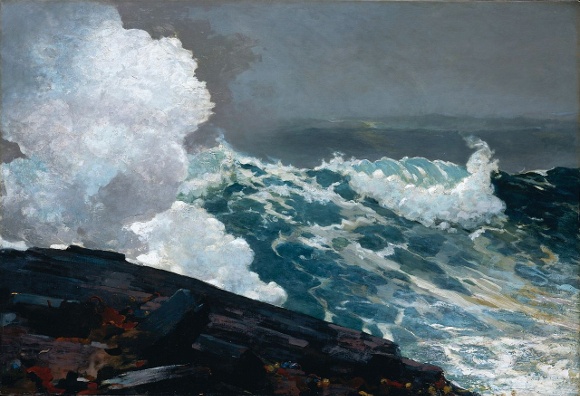Othello Contents
- Religious/ philosophical context
- Theatrical context
Seas and shipping
Background
Surrounded by water, Venice was a seafaring state, its wealth dependant on its trade and island dominions (such as Cyprus), so the sea was intrinsic to its very existence.
Within the play, although Othello is a soldier whose military exploits are recounted, the only conflict reported from the stage is a sea battle with the Turkish fleet. These two aspects of the Mediterranean – its danger and its bounty - provide Shakespeare with a rich source of imagery.
The sea as an image for love
Othello first uses the vastness of the sea as a metaphor for the extent of his love for Desdemona:
But that I love the gentle Desdemona
I would not my unhoused free condition
Put into circumscription and confine
For the sea’s worth. (Act 1 Scene 2) The subterfuge of their hidden passion and the desperate action of military engagement have been like a storm for Othello (literally and emotionally), but the wonder of reuniting with his new wife when he lands on Cyprus means that he would endure it all over again, for the joy of the calm afterwards:
If after every tempest come such calms,
May the winds blow till they have wakened death,
And let the labouring barque climb hills of seas
Olympus-high, and duck again as low
As hell’s from heaven. If it were now to die
’Twere now to be most happy, (Act 2 Scene 1) Cassio expresses everyone’s feelings of happiness at Othello’s marriage with a nautical metaphor in Act 2 Scene 1. First he praises Desdemona’s saintliness by describing the storms that are trying to prevent her safe arrival on Cyprus as ‘traitors’ and the keel of the boat carrying her as ‘guiltless.’ He then uses the image of a ship sailing into safe harbour to describe the act of love between the newly-weds:
Great Jove, Othello guard,
And swell his sail with thine own powerful breath,
That he may bless this bay with his tall ship,
Make love’s quick pants in Desdemona’s arms, According to Cassio, Desdemona is ‘the riches of the ship,’ as valuable as a cargo of treasure would be to the money-hungry Venetians.
Even Iago reflects a positive aspect of seafaring when he compares the success of his evil scheming with the smooth passage of a sailing boat:
If consequence do but approve my dream,
My boat sails freely both with wind and stream (Act 2 Scene 3)
My boat sails freely both with wind and stream (Act 2 Scene 3)
Negative passion
When Othello’s love dies as a consequence of Iago’s machinations in Act 3 Scene 3, he uses a more forbidding aspect of the sea to express his intentions of violent revenge:
Like to the Pontic Sea,
Whose icy current and compulsive course
Ne’er knows retiring ebb, but keeps due on
To the Propontic and the Hellespont,
Even so my bloody thoughts with violent pace
Shall ne’er look back, ne’er ebb to humble love,
Till that a capable and wide revenge
Swallow them up. In the final scene, once Desdemona’s life is (mistakenly) ended, Othello has no further desire to carry on – the ‘voyage’ of love has ended in guilt and despair:
Here is my journey’s end, here is my butt
And very sea-mark of my utmost sail.
(Act 5 Scene 2) The threat of the sea
Iago uses sea imagery to express his feelings of envy and cynicism. In Act 1 Scene 1, he shows his unhappiness at his circumstances by describing himself as ‘beleed and calmed,’ technical terms for a sailing ship that has no wind to enable its progress.
He describes Othello’s marriage in a distasteful way: ‘he hath boarded a land-carrack,’ with the implication that Desdemona is a tawdry prize (Act 1 Scene 2). Brabantio also describes his sorrow at losing his daughter with an image of being flooded: ‘my particular grief / Is of so floodgate and o’erbearing nature…’ (Act 1 Scene 3)
In Act 2 Scene 1, the sea storm is described by minor characters with very powerful and threatening imagery which prefigures the approaching storm in the relationship between Othello, Desdemona and Iago. The ‘foaming shore,’ the ‘chidden billow,’ the high and monstrous mane’ and the ‘enchafed flood’ all describe a tumult destructive enough to overwhelm the Turkish enemy. Ominously, the third gentleman describes the tempest as ‘desperate’, ‘foul and violent.’

An image or form of comparison where one thing is said actually to be another - e.g. 'fleecy clouds'.
